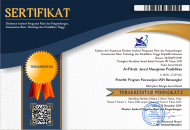Curriculum Development Management: Challenges and Opportunities in the Era of Global Education
Abstract
Keywords
Full Text:
PDFReferences
Agarwal, S., & Linh, N. T. D. (2021). A Study of Student’s Subjective Well-Being Through Chatbot in Higher Education. In V. E. Balas, V. K. Solanki, & R. Kumar (Eds.), Further Advances in Internet of Things in Biomedical and Cyber Physical Systems (Vol. 193, pp. 383–403). Springer International Publishing. https://doi.org/10.1007/978-3-030-57835-0_28
Aju, W., & Mack, V. V. (2022). Automatic Monitoring Technology of Business English Document Translation Equipment Based on Logistic Model. In V. Sugumaran, A. G. Sreedevi, & Z. Xu (Eds.), Application of Intelligent Systems in Multi-modal Information Analytics (Vol. 138, pp. 987–992). Springer International Publishing. https://doi.org/10.1007/978-3-031-05484-6_132
Alammary, A., Sheard, J., & Carbone, A. (2014). Blended learning in higher education: Three different design approaches. Australasian Journal of Educational Technology, 30(4). https://doi.org/10.14742/ajet.693
Alamri, H., Lowell, V., Watson, W., & Watson, S. L. (2020). Using personalized learning as an instructional approach to motivate learners in online higher education: Learner self-determination and intrinsic motivation. Journal of Research on Technology in Education, 52(3), 322–352. https://doi.org/10.1080/15391523.2020.1728449
Ansori, M. (2021). Pengembangan Kurikulum Madrasah Di Pesantren. Munaddhomah: Jurnal Manajemen Pendidikan Islam, 1(1), 41–50. https://doi.org/10.31538/munaddhomah.v1i1.32
Arantes, J. (2023). Educational data brokers: Using the walkthrough method to identify data brokering by edtech platforms. Learning, Media and Technology, 1–14. https://doi.org/10.1080/17439884.2022.2160986
Bailey, D. R., Almusharraf, N., & Almusharraf, A. (2022). Video conferencing in the e-learning context: Explaining learning outcome with the technology acceptance model. Education and Information Technologies, 27(6), 7679–7698. https://doi.org/10.1007/s10639-022-10949-1
Banihashem, S. K., Aliabadi, K., Pourroostaei Ardakani, S., Delaver, A., & Nili Ahmadabadi, M. (2018). Learning Analytics: A Systematic Literature Review. Interdisciplinary Journal of Virtual Learning in Medical Sciences, 9(2). https://doi.org/10.5812/ijvlms.63024
Boranbayev, A., Baidyussenov, R., & Mazhitov, M. (2021). Development and Design of a Library Information System Intended for Automation of Processes in Higher Education Institution. In K. Arai (Ed.), Intelligent Computing (Vol. 285, pp. 437–445). Springer International Publishing. https://doi.org/10.1007/978-3-030-80129-8_31
Davies, R., Nyland, R., Bodily, R., Chapman, J., Jones, B., & Young, J. (2017). Designing Technology-Enabled Instruction to Utilize Learning Analytics. TechTrends, 61(2), 155–161. https://doi.org/10.1007/s11528-016-0131-7
Dymon, U. (1996). Transition in Cartographic Education in the United States: Challenges and Opportunities in Curriculum Design. Cartographica: The International Journal for Geographic Information and Geovisualization, 33(3), 39–44. https://doi.org/10.3138/W161-918W-1638-5H96
Edwards, J. (2007). Challenges and Opportunities for the Internationalization of Higher Education in the Coming Decade: Planned and Opportunistic Initiatives in American Institutions. Journal of Studies in International Education, 11(3–4), 373–381. https://doi.org/10.1177/1028315307303920
Fachrurazi, Rukmana, A. Y., Supriyanto, Syamsulbahri, & Iskandar. (2023). Revolusi Bisnis di Era Digital: Strategi dan Dampak Transformasi Proses Teknologi terhadap Keunggulan Kompetitif dan Pertumbuhan Organisasi. Jurnal Bisnis Dan Manajemen West Science, 2(03), 297–305. https://doi.org/10.58812/jbmws.v2i03.563
Gibson, K. L., Rimmington, G. M., & Landwehr-Brown, M. (2008). Developing Global Awareness and Responsible World Citizenship With Global Learning. Roeper Review, 30(1), 11–23. https://doi.org/10.1080/02783190701836270
Gregersen-Hermans, J. (2021). Toward a Curriculum for the Future: Synthesizing Education for Sustainable Development and Internationalization of the Curriculum. Journal of Studies in International Education, 25(4), 461–481. https://doi.org/10.1177/10283153211031033
Guerin, S. H. (2009). Internationalizing the Curriculum: Improving Learning Through International Education: Preparing Students for Success in a Global Society. Community College Journal of Research and Practice, 33(8), 611–614. https://doi.org/10.1080/10668920902928945
Hasbi, R. P. A. C., & Mahmudah, F. N. (2020). PENGEMBANGAN KURIKULUM SEKOLAH BERBASIS KEWIRAUSAHAAN DI SMA NEGERI 1 TEMON. Nidhomul Haq : Jurnal Manajemen Pendidikan Islam, 5(2), 180–194. https://doi.org/10.31538/ndh.v5i2.563
Heitmann, G. (2005). Challenges of engineering education and curriculum development in the context of the Bologna process. European Journal of Engineering Education, 30(4), 447–458. https://doi.org/10.1080/03043790500213136
Hicks, D. (2003). Thirty Years of Global Education: A reminder of key principles and precedents. Educational Review, 55(3), 265–275. https://doi.org/10.1080/0013191032000118929
Lau, C. L., & Al-Hawamdeh, S. (2002). Knowledge Management Education and Curriculum Development. Journal of Information & Knowledge Management, 01(02), 99–118. https://doi.org/10.1142/S021964920200042X
Lukita, C., Suwandi, S., Harahap, E. P., Rahardja, U., & Nas, C. (2020). Curriculum 4.0: Adoption of Industry Era 4.0 as Assessment of Higher Education Quality. IJCCS (Indonesian Journal of Computing and Cybernetics Systems), 14(3), 297. https://doi.org/10.22146/ijccs.57321
Marshall, H. (2007). Global education in perspective: Fostering a global dimension in an English secondary school. Cambridge Journal of Education, 37(3), 355–374. https://doi.org/10.1080/03057640701546672
Olds, K. (2007). Global Assemblage: Singapore, Foreign Universities, and the Construction of a “Global Education Hub.” World Development, 35(6), 959–975. https://doi.org/10.1016/j.worlddev.2006.05.014
Ramadhan, O. M., Hermawan, A. H., & Erihadiana, M. (2021). Pengembangan Kurikulum Pendidikan Islam di Era New Normal. Jurnal Intelektual: Jurnal Pendidikan Dan Studi Keislaman, 11(1), 32–45. https://doi.org/10.33367/ji.v11i1.1588
Šašinka, Č., Stachoň, Z., Sedlák, M., Chmelík, J., Herman, L., Kubíček, P., Šašinková, A., Doležal, M., Tejkl, H., Urbánek, T., Svatoňová, H., Ugwitz, P., & Juřík, V. (2018). Collaborative Immersive Virtual Environments for Education in Geography. ISPRS International Journal of Geo-Information, 8(1), 3. https://doi.org/10.3390/ijgi8010003
Scoffham, S. (2018). Global learning: A catalyst for curriculum change. International Journal of Development Education and Global Learning, 10(2). https://doi.org/10.18546/IJDEGL.10.2.03
Surani, D., Kusuma, J. W., & Kusumawati, N. (2020). Platform Online Dalam Perkuliahan Pada Masa Pandemi Covid-19. Jurnal Pendidikan: Teori, Penelitian, Dan Pengembangan, 5(9), 1338. https://doi.org/10.17977/jptpp.v5i9.14057
Vulliamy, G., & Webb, R. (1993). Progressive Education and the National Curriculum: Findings from a global education research project. Educational Review, 45(1), 21–41. https://doi.org/10.1080/0013191930450103
Yin, H., Lee, J. C.-K., & Wang, W. (2014). Dilemmas of leading national curriculum reform in a global era: A Chinese perspective. Educational Management Administration & Leadership, 42(2), 293–311. https://doi.org/10.1177/1741143213499261
Zinser, R. (2012). A curriculum model of a foundation for educating the global citizens of the future. On the Horizon, 20(1), 64–73. https://doi.org/10.1108/10748121211202080
DOI: http://dx.doi.org/10.31958/jaf.v11i2.11861
Refbacks
- There are currently no refbacks.
Copyright (c) 2023 Suwarni Suwarni

This work is licensed under a Creative Commons Attribution-NonCommercial 4.0 International License.
__________________________________________________________________________
 | Al-Fikrah: The Journal of Educational Management |
Creations are disseminated below Lisensi Creative Commons Atribusi-NonKomersial 4.0 Internasional.













